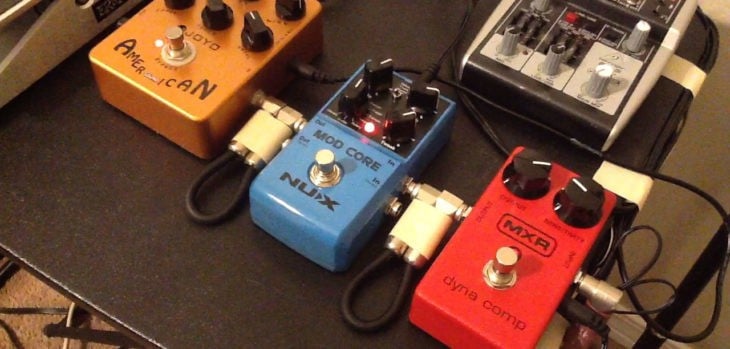In my pursuit of an “affordable” modulation pedal, I couldn’t help but take notice of the Mod Core manufactured by NUX. Of course, it didn’t appear to be “The Holy Grail” of modulation pedals by any stretch of the imagination, but for a guitar pedal under fifty dollars, I couldn’t believe just how many modulation types are on offer here…
The Review
The Mod Core has eight different types of modulation: Chorus, Flanger, Phaser, Tremolo, Rotary, Pan, U-Vibe and Vibrato. There are four basic controls for “Rate”, “Depth”, modulation “Type” and “Tweak”, which isn’t functional in every mode, but even though the functionality of the Tweak control is poorly documented within the context of the manual, it seems to be a simple mix control in most cases.
The Mod Core also has a three-way toggle switch for “Normal” and “Deluxe” modes and “Tone Lock”, which will either freeze the current settings (all knobs are then disabled) or save a preset for recall after (in the order specified by the manual) pressing and holding the footswitch and selecting the Tone Lock position, powering the pedal off and selecting the Tone Lock Position (when did I leave that position?) then finally powering the pedal back on.
^ This doesn’t work for me, but it’s probably just the confusing directions stemming from poor English translation of the Chinese manual, which doesn’t even provide a general description of Deluxe mode; it just passively mentions Deluxe mode in the description of the toggle switch. A YouTuber who goes by the name “PixxyLixxx” reviewed the Mod Core in 2016, who goes on to say that Deluxe mode “sounds like a phase inversion”, which I agree, it definitely sounds out of phase, so I think that’s a fair assumption.
The Mod Core has true bypass and true stereo inputs and outputs, so you can use it as a mono effect or a stereo effect before or after the amp. I only have a single amp emulation pedal (which I reviewed not long ago) so I’m afraid I can’t run the stereo output to separate amps. I can, however, run both the stereo outputs into my stereo delay and reverb pedals, even though I’m not thrilled with the result. I’ll explain why…
The overall quality of the modulation won’t blow your mind. In fact, there’s a considerable amount of coloration to the input that “darkens” your resultant tone. But this isn’t always a result of the modulation itself. I personally prefer using the Mod Core as a mono effect prior to the amp because my preamplified signal has not yet been colored by the amp circuit; this avoids unpleasant “tone suckage” you often hear about, especially when it comes to modulation pedals. I’m also thinking about purchasing a second amp simulation pedal for the sole purpose of embracing the true stereo functionality to its fullest potential.
Unfortunately, using the Mod Core as a mono effect will cost you: The Pan mode becomes a second Tremolo mode since it’s modulating between the mono signal and a second signal that’s not connected. However, I actually prefer this to the Tremolo mode, which sounds like a sine wave; for slow tremolo, this is fine, but I like my tremolo pretty fast. The Pan mode seems to use a triangle wave, which results in a more constant rate of modulation as opposed to the round peaks and valleys of a sine wave, which almost sounds like a smoothed square wave at high speeds.
The Verdict
I’ve heard better chorus, flanger and phaser effects, but considering the price and the sheer amount of modulation types, I think the Mod Core is an obvious choice for players on a budget. The flanger might sound a bit too harsh, but I think this is a result of feedback / feedforward; try slowing your rate down or maybe decreasing the depth a bit. This is a pedal that requires a bit of experimentation. You’re going to have to roll up your sleeves and turn some knobs.
Another major selling point definitely has to be the U-Vibe mode, which emulates the legendary Shin-ei Uni-Vibe pedal used by Jimi Hendrix and David Gilmour. It’s a bit dark for my tastes, but I can see why a lot of players spring for that sort of “vibe”, pardon the pun.
But seriously, it’s a cheap pedal with tons of options, and it sounds good. Not great, but good. Besides, I’m one of those shoegazing “new wavers” who typically uses gobs of reverb and delay; you’re not really going to hear the Mod Core at work after I’m done with the signal chain. That being said, for the general purpose of bread and butter modulations, the Mod Core does exactly what you need it do for a fraction of the price of boutique modulation pedals that don’t offer half as many options.
More info: NUX Mod Core ($42.74 @ GearBest)
NUX Mod Core Review
Mod Core is a cheap pedal with tons of options, and it sounds good.
-
Design8
-
Sound7
-
Price10


